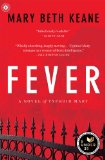Summary | Excerpt | Reading Guide | Reviews | Beyond the Book | Readalikes | Genres & Themes | Author Bio

Mary took the jug of milk the butler extended toward her. "Is it really gone?" she asked as she lifted it to her nose. "It's gone," she confirmed, clenching her teeth against the urge to vomit. She walked quickly to the narrow back door to throw it out. There was a faint sucking sound as the milk pulled away from the jug, and Mary watched it fly through the air as a solid thing until it landed, about six feet away, a white lump in the wet grass. In a few seconds the foul smell filled up the space between the lump and the doorway where Mary was still standing. She fetched the kettle, just boiled, and hurried outside to stand over the wet lump with her head swiveled away as she poured the steaming water over it. She turned back just in time to watch it disappear in curdled rivers, get caught up in the green blades, soak into the ground. "Is that the end of it?" The butler asked, worried, casting his eyes toward the long hall that led back to the dining room.
"There's more. There's plenty," Mary said. "That was only what I was saving for bread, but I forgot, last night, when I made the bread I used the buttermilk. I was too quick. The ice is low. I broke off big pieces to put in the child's bath, and what's left of the block needs more sawdust. They need a right icebox here is what they need. They need one of those zinc-lined jobs. I put the good milk in the back of the box, but this morning—" Mary thought she heard a footstep in the hall. She raised a finger to the butler to wait.
"This morning?" he said. They were alone. The recently cut timbers of the house creaked under the weight of the night's lashing rain, and now, even with every single window open and every door propped wide, the air was thick and hot. It settled on everything and all morning the collar of Mary's dress had felt like a noose.
"Nothing." It was no use explaining. Mr. Kirkenbauer was waiting in the dining room with his bowl of dry blueberries and his coffee still black. "Here," Mary said, putting a fresh jug onto the butler's salver. She'd have to make new bread for lunch to make up for the mistake, even though there was nearly a full loaf on the counter from yesterday, even though that loaf would be fine with a little toasting, a pat of butter spread on top.
"How's the child this morning?" the butler asked. His room was on the third floor, and thanks to that distance he had gotten a full night's sleep.
"No better, no worse. Poor thing."
The butler nodded. "About the milk, Mary. It's only to be expected in this heat. That's probably why the child feels feverish. I feel feverish myself."
Not all butlers were so kind, but it seemed to work from one extreme to another in every house she had cooked for. Either the staff was a team that signaled one another with silences or a clandestine nod, or they were competitors, each one trying to smudge out the others' good work.
Mary had been with the Kirkenbauers for only a month when the boy got sick, and later, when she looked back, she struggled to remember exactly what circumstances had brought her there, all the way up to Dobbs Ferry, when there were plenty of open positions in Manhattan. Alfred was still finding good work in 1899. He was still getting a clean shave every other day, earning Friday wages he handed over to Mary to pay a portion of their rent, their food. The agency had often wanted to send her to New Jersey, or Connecticut, or over to the western side of the Hudson where the trains didn't reach, but she always refused unless they were short-term jobs that paid too much to decline, and ultimately those families usually went with a lesser cook, someone who couldn't get a job with a Manhattan family. But Mary could get a job with a Manhattan family, so why had she agreed to go up there to Dobbs Ferry to a woman who was not a proper mistress but half-servant herself, the way she leaned in to the pot to be scrubbed, the way she cast her eye around the kitchen for grease. Maybe it was because when she met Mrs. Kirkenbauer at the agency there was something about the woman she liked. She didn't ask Mary if she was a Christian. She didn't ask if she was married or planning on getting married. She asked only about her cooking, and when the woman talked about food, about the responsibility of getting meals together every day of the week, she seemed to be speaking from experience.
Excerpted from Fever by Mary Beth Keane. Copyright © 2013 by Mary Beth Keane. Excerpted by permission of Scribner. All rights reserved. No part of this excerpt may be reproduced or reprinted without permission in writing from the publisher.
Your guide toexceptional books
BookBrowse seeks out and recommends the best in contemporary fiction and nonfiction—books that not only engage and entertain but also deepen our understanding of ourselves and the world around us.